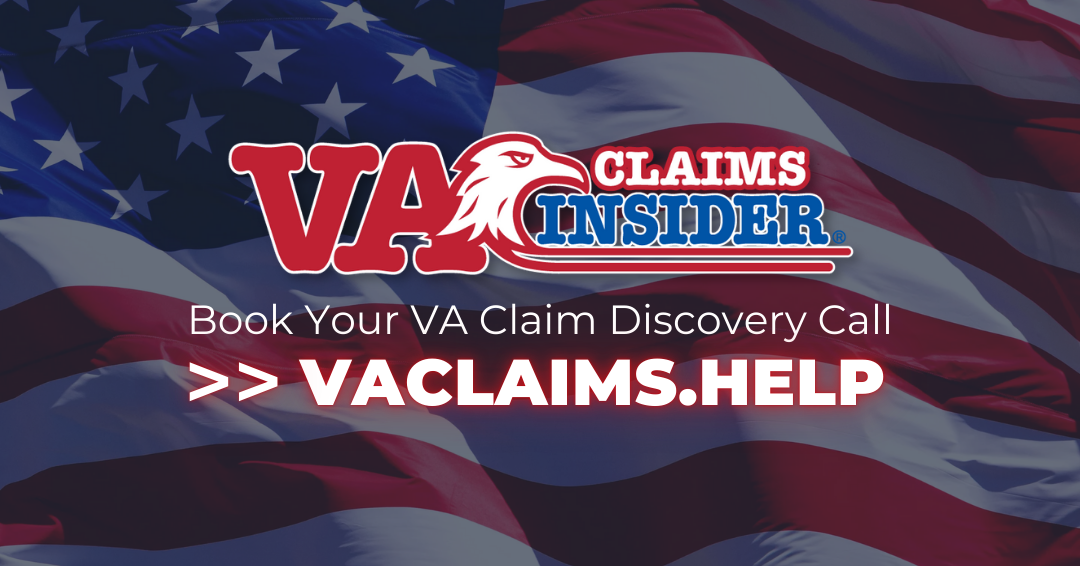Looking for Expert-Level VA Claim Answers?📱Call Us Now! 737-295-2226
Fellow veterans let’s face it: Bad C&P exams happen far more often than they should, and they can seriously derail your VA claim and rightfully earned VA disability benefits.
But here’s the good news—you’ve got the power!
If you’ve had a terrible experience with a C&P examiner or feel that your condition was misunderstood, you can take steps to demand a new exam before your claim is finalized.
However, time is critical, and you need to act fast.
In this post, we’ll uncover the harsh reality of bad C&P exams, why they occur, and—most importantly—how you can fight back to ensure your claim is accurately evaluated.
Let’s dive deep into the exact steps you need to take after a bad C&P exam and how to regain full control of your VA disability claim before facing a possible denial or low rating.
Table of Contents
4-Minute Video Explainer: Brian Reese Reveals How to Fight Back Against a Bad C&P Exam (Step-By-Step!)
Summary of Key Points
- Bad C&P Exams Can Derail Your Claim: Poorly conducted C&P exams are more common than they should be and can lead to claim denials or low disability ratings that don’t reflect your condition’s severity.
- Take Immediate Action if You Have a Bad Exam: Veterans have the power to fight back by requesting a new exam before the VA finalizes a decision. However, time is crucial, and quick action is essential to avoid an unfavorable outcome. Call 1-800-827-1000 immediately and ask for a new C&P exam.
- C&P Exams Play a Critical Role in Your VA Disability Rating: The results from a C&P exam heavily influence the VA rater’s decision to approve, deny, or defer your VA claim. A strong and accurate exam can significantly impact the rating and compensation you receive.
- Action Steps to Fix a Bad C&P Exam: If you experience a bad C&P exam, you should call the VA hotline phone number, document the important details in a Memorandum for Record (MFR), among other options listed in this article below.
What is a C&P Exam?
The Compensation and Pension (C&P) exam is a medical evaluation scheduled by the VA or a VA-contracted examiner.
The purpose of the exam is to assess:
- Whether you have the condition you’ve claimed and it’s diagnosed.
- If the condition is related to your military service, another service-connected disability, or it’s presumptive (i.e., service connection).
- The severity of your symptoms in terms of frequency, severity, and duration as well as how those symptoms negatively impact your work, life, and social functioning.
The results of your C&P exam play a huge role in determining your VA disability rating, which directly affects your monthly compensation.
Whether your claim is approved or denied, or if your disability rating is increased or decreased, it often hinges on the findings from the C&P exam.
Why Are Some C&P Exams Bad?
Unfortunately, not all C&P exams are conducted with the care and thoroughness they require.
In reality, bad C&P exams are unfortunately quite common, and many veterans experience them during the VA disability claims process.
A variety of issues, ranging from examiner training to biases, can result in veterans receiving inadequate or inaccurate evaluations.
Below are some of the most common reasons why C&P exams may fall short:
1. Untrained or Unqualified C&P Examiners
One of the most significant issues with some C&P exams is that the examiner may not have the appropriate expertise or training to assess the condition accurately. Conditions like PTSD, traumatic brain injury (TBI), chronic pain, or musculoskeletal disorders often require examiners with specialized knowledge. When an examiner lacks experience or training in a particular area, they may not understand the full scope of the condition, leading to incomplete evaluations.
Example: An examiner without mental health training may misinterpret the severity of a veteran’s PTSD symptoms, resulting in an inaccurate diagnosis or a lower disability rating.
2. Rushed C&P Exams
Many veterans report that their C&P exams lasted only a few minutes, during which the examiner failed to ask detailed questions or perform necessary physical or mental assessments. Rushed exams are problematic because they don’t provide the examiner enough time to fully understand the veteran’s condition, resulting in incomplete or inaccurate reports.
Example: In a musculoskeletal disability exam, if the examiner does not thoroughly assess range of motion with a goniometer or the impact of pain during daily activities, the VA might undervalue the veteran’s condition, resulting in a lower rating.
3. Bias or Dismissiveness
One of the most problematic issues veterans face during C&P exams is the potential for examiner bias or dismissiveness. Some examiners may carry a personal bias against veterans, whether due to preconceived notions or a lack of empathy for the unique struggles veterans face. This bias can result in the examiner downplaying the severity of a veteran’s condition, particularly for conditions like chronic pain or mental health issues that are “invisible” and not easily measurable through physical tests. Unfortunately, this dismissiveness can undermine the validity of the veteran’s symptoms and lead to inaccurate evaluations.
A contributing factor to this problem is what I call “exposure syndrome,” where C&P examiners, over time, become desensitized to the veterans’ stories. The more claims they hear, especially those involving similar symptoms, the more they may tune out or discredit the severity of the conditions. Instead of giving each claim the attention and empathy it deserves, these examiners may become indifferent or even numb to the veteran’s situation. This lack of attentiveness can have devastating consequences for veterans seeking accurate compensation.
Example: A veteran suffering from PTSD or chronic pain may have their symptoms minimized by an examiner who has heard similar stories numerous times and, as a result, doubts the credibility or severity of the veteran’s condition. This could lead to an unfairly low disability rating or, worse, a denial of service-connection altogether.
4. Dismissal of Fee-Based Private Medical Evidence
It’s not uncommon for some C&P examiners to dismiss or devalue private medical evidence submitted by veterans, especially when it comes from an independent medical examiner who was compensated for their services. This can be frustrating and hypocritical, considering that C&P examiners are also fee-based and paid by the VA for conducting their evaluations. Both types of examiners—whether private or contracted by the VA—are paid for their work, so dismissing independent evidence purely on the grounds that it was fee-based is unfair and not in line with VA guidelines.
According to the M21-1 Adjudication Procedures Manual, there is no preference for or against treating physicians or independent examiners, meaning all competent medical evidence should be considered equally, regardless of whether it came from a fee-based examiner. If a C&P examiner unfairly dismisses your private medical evidence and your claim is denied, you should consider filing a Higher-Level Review (HLR) to address this mistake and ensure that your evidence is properly evaluated.
Example: A veteran diagnosed with Major Depressive Disorder submits a comprehensive mental health evaluation and independent medical opinion from a privately hired fee-based examiner. However, the C&P examiner disregards the report solely because it was conducted by a paid independent provider, leading to a denial of the veteran’s claim.
5. Pencil-Whipped C&P Exams
A “pencil-whipped” exam occurs when the examiner rushes through the Disability Benefits Questionnaire (DBQ) without actually conducting a proper evaluation. Some examiners may fill out the DBQ with pre-determined conclusions, regardless of the veteran’s actual condition. This leads to reports that fail to capture the severity of the veteran’s symptoms and the real impact on their daily life.
Example: An examiner might mark “normal range of motion” on a DBQ for a veteran with a severe back injury without conducting any physical tests, resulting in a lower disability rating.
6. Inaccurate Assessment of Severity of Symptoms
In some cases, an examiner may misunderstand or misinterpret the veteran’s symptoms, especially if they are complex or fluctuate over time. For example, conditions like migraines, chronic fatigue, or mental health disorders can vary in severity from day to day. If the examiner only considers the veteran’s condition on their “best day” instead of their typical or worst day, it can result in an inaccurate assessment.
Example: A veteran suffering from migraine headaches might have only mild symptoms during the exam, but experience severe, debilitating migraines on a regular basis. If the examiner does not take this into account, the VA could issue a lower rating or deny the claim altogether.
7. Negative Medical Opinions Not Based on Evidence Based Rationale
A negative medical opinion often stems from an examiner concluding that a veteran’s condition is “less likely than not” connected to their military service. This phrase carries significant weight in the VA’s decision-making process and can lead to a denial of benefits. Unfortunately, these negative opinions may result from a lack of thorough review of the veteran’s full medical history, misinterpretation of symptoms, or even a rushed evaluation. At times, it seems that some C&P examiners may not fully grasp the implications of this statement, not realizing that this determination is likely to deny the veteran service connection and, ultimately, the compensation they deserve. This underscores the importance of ensuring that medical opinions are backed by a clear, evidence-based rationale to prevent wrongful denials.
Example: If a veteran’s PTSD is linked to military service but the examiner fails to properly connect it to their in-service stressor, the VA may deny the claim based on an incomplete medical opinion.
8. Unable to Give a Medical Opinion Without Resorting to Mere Speculation
In my opinion, this is a frustrating cop-out that shouldn’t be allowed in the VA disability claims process. The VA’s system is supposed to be non-adversarial, where the examiner’s role is to fairly assess a veteran’s condition based on the evidence. The “benefit of the doubt” rule applies, meaning that if the evidence is evenly balanced, the decision should favor the veteran. The examiner is simply offering their medical opinion on whether the evidence is equally balanced, meaning there is a 50% chance that the veteran’s condition is related to service (“at least as likely as not”).
Unfortunately, some C&P examiners may claim they are “unable to provide a medical opinion without resorting to mere speculation.” This typically happens when the examiner feels they don’t have enough information to make a definitive connection between your condition and your military service. While the intention is to avoid an inaccurate or misleading conclusion, it can often feel like a way to avoid taking responsibility for an opinion. For veterans, this can be incredibly frustrating, as it can lead to delays or even denials, making it harder to get the benefits you’ve earned. The key here is to ensure all relevant evidence and records are submitted to avoid these situations.
Example: An examiner might refuse to provide an opinion on whether a veteran’s knee pain is related to an old service injury because they lack enough medical history, forcing the veteran to gather more evidence or undergo another exam.
Real-Life Examples of Bad C&P Exams
Over the years, veterans have shared countless stories about their experiences with bad C&P exams.
Here are just a few examples:
- No Range of Motion (ROM) Test for Musculoskeletal Conditions: One veteran reported that the examiner didn’t even conduct range of motion tests, yet the C&P examiner’s report stated that the veteran had “full flexion” and no functional limitations. This false information could have led to a lower disability rating for musculoskeletal conditions, which often require accurate ROM measurements with a goniometer. The veteran called 1-800-827-1000 and requested a new C&P exam. The claim was eventually decided in the veteran’s favor.
- Dismissal of Combat-Related PTSD and Symptoms: A veteran seeking compensation for PTSD was told by the examiner that they were “malingering” (faking symptoms), despite extensive medical records detailing their mental health struggles. This kind of dismissal can result in claim denials and prolong the appeals process. The veteran’s DD 214 showed he served in Afghanistan during Operation Enduring Freedom. Yet, the C&P examiner stated the veteran didn’t deploy overseas and didn’t experience any combat stressor events. The veteran called 1-800-827-1000, requested a new C&P exam for PTSD, which was granted. The veteran was awarded a 70% VA rating for PTSD after a second C&P exam for PTSD.
- ACE Exam Incorrect Theory of Service Connection: One veteran had an ACE exam phone consultation with a C&P examiner for obstructive sleep apnea, during which the examiner incorrectly attributed their condition to obesity, despite service-connected nasal and tonsil surgeries. The veteran had filed the OSA claim secondary to nasal and tonsil issues and even had a Nexus Letter for a secondary condition. The veteran filed a Supplemental Claim and had a second C&P exam to receive the correct 50% disability rating with a CPAP machine.
- Failure to Address a Secondary Condition: A veteran with service-connected knee pain also developed severe hip pain due to years of overcompensating for the knee injury. During the C&P exam, the examiner only focused on the knee and completely ignored the veteran’s complaints about the hip. The examiner failed to document the veteran’s claim that the hip condition was secondary to the knee injury. As a result, the veteran was initially denied compensation for the secondary condition and had to appeal the decision with a Supplemental Claim by submitting new and relevant evidence not previously considered. A second C&P exam corrected the errors from the first exam and the veteran was eventually awarded secondary service connection.
What To Do If You Get a Bad C&P Exam Plus How to Get a New Exam
If you’ve had a bad C&P exam, don’t worry, you can take steps to correct the situation and request a new exam!
Here’s how:
- Call the VA Hotline Immediately: Contact the VA at 1-800-827-1000 and explain the problems you encountered during your C&P exam. Ask the representative to make a note in your records and request a new exam. This is a crucial first step, as the VA needs to be aware of the issue as soon as possible. You should try to do this as soon as possible!
- Write a Memorandum for Record (MFR): Just like we wrote in the military, document the details of your bad C&P exam in a Memorandum for Record (MFR). Stick to the facts and pertinent details only. Include information such as who conducted the exam, what went wrong, and why you believe the exam was incomplete or inaccurate. Upload this document to your VA.gov account for the disability claim and condition in question to ensure it becomes part of your claim file.
- File a Formal Complaint: If you believe the examiner was biased or unprofessional, consider filing a formal complaint with the VA or even your state’s House and Senate representatives. This can help hold the examiner accountable and may result in more oversight into future exams.
- Write an Online Review of the C&P Examiner: If you got a bad C&P examiner, consider writing an online Google, Yelp, or other platform review of the provider to warn other veterans. I think this is one of the most powerful things we can do as veterans to stop bad C&P examiners.
- Request Your C&P Exam Results ASAP: Most likely your exam was not conducted through the VA by a VA-provider. If your exam is conducted by a private company, you’ll need to request a copy of your VA claims file (C-File). However, the fastest and easiest way to get your C&P exam results is to ask your accredited VSO to download copies from the Veteran Benefits Management System (VBMS).
Conclusion & Wrap-Up: The Importance of Fighting Back Against Bad C&P Exams
Bad C&P exams can have a significant impact on your VA disability claim, but that doesn’t mean you have to accept the results.
By taking immediate action, documenting your concerns, and requesting a new exam, you can ensure that your claim is fairly evaluated.
The C&P exam is a vital step in the claims process, and you deserve an accurate and thorough evaluation.
Don’t let a bad examiner stand between you and the benefits you’ve earned through your service.
With proper preparation and persistence, veterans can overcome bad C&P exams and secure the VA disability benefits they deserve.
Follow the steps outlined in this blog post, and remember—you have the right to a fair and accurate assessment of your service-connected disabilities.
YOU SERVED. YOU DESERVE. VA Claims Insider Has Your Six!

- VA Claims Insider is the #1 most trusted name in VA disability claims.
- Work directly with a VA claims coach who can help lead you to VA claim victory.
- 25,000+ disabled veterans served in our membership programs since 2016.
- 30% average rating increase for veterans who complete our #1 rated Elite program.
- 4.7/5.0 average rating out of 5,500+ total reviews; over 4,500 5-star reviews.
About the Author

Brian Reese
Brian Reese is a world-renowned VA disability benefits expert and the #1 bestselling author of VA Claim Secrets and You Deserve It. Motivated by his own frustration with the VA claim process, Brian founded VA Claims Insider to help disabled veterans secure their VA disability compensation faster, regardless of their past struggles with the VA. Since 2013, he has positively impacted the lives of over 10 million military, veterans, and their families.
A former active-duty Air Force officer, Brian has extensive experience leading diverse teams in challenging international environments, including a combat tour in Afghanistan in 2011 supporting Operation ENDURING FREEDOM.
Brian is a Distinguished Graduate of Management from the United States Air Force Academy and earned his MBA from Oklahoma State University’s Spears School of Business, where he was a National Honor Scholar, ranking in the top 1% of his class.




